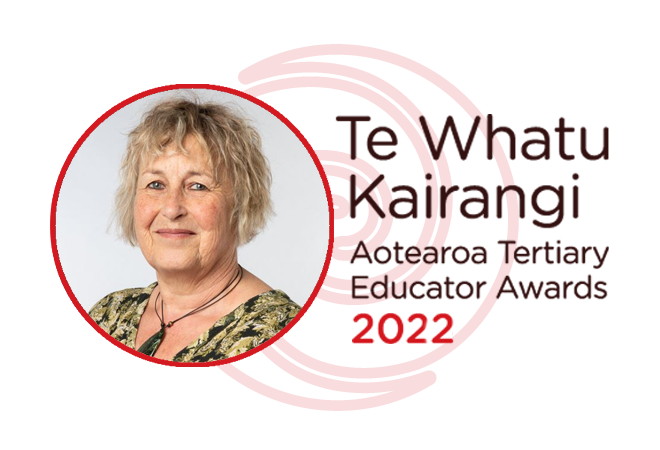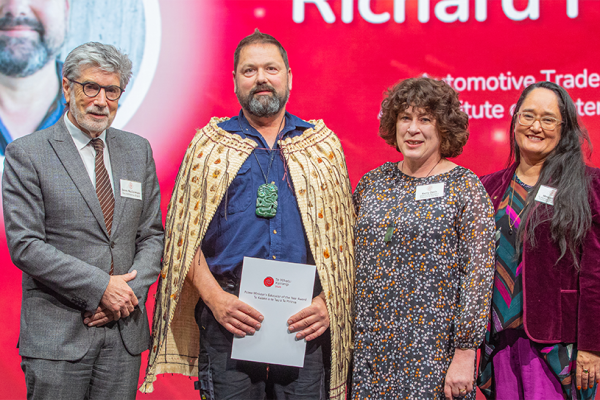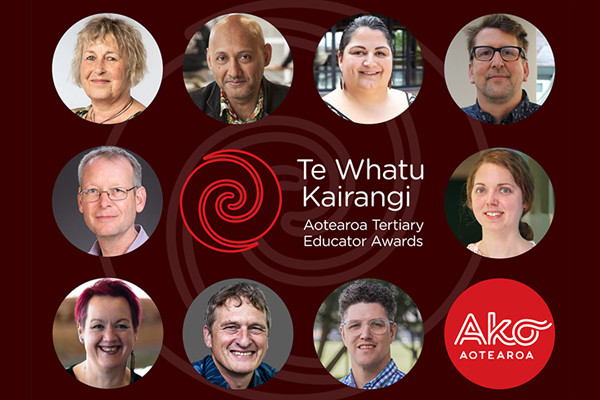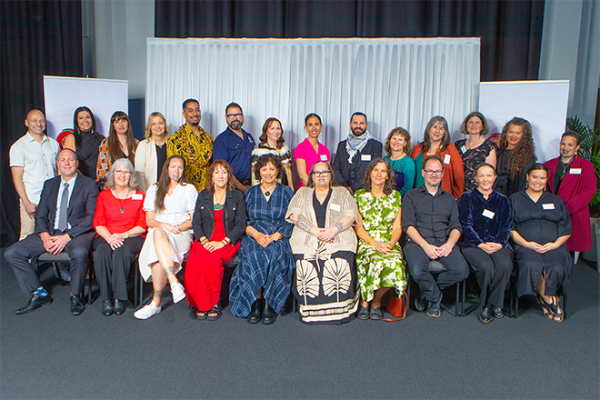Eileen Britt
Crossing boundaries and building strong partnerships
Category winner | Progressing educational partnerships and collaboration
Associate Professor, Psychology | Te Whare Wānanga o Waitaha | University of Canterbury
Watch Eileen Britt's Teaching profile video
“I strive to work in partnerships to facilitate others; build rapport and trust; respect others’ autonomy, expertise and experiences; and commit to fostering the welfare and best interests of all.”
It was Eileen’s father who showed her the power of partnership in education. As a Pākehā art teacher, he partnered with school students and Māori to create murals using non-traditional and traditional materials which now adorn the walls of schools and other public places, including Te Whare Wānanga o Waitaha | University of Canterbury (UC). Eileen believes these endeavours produced more than artefacts - they also produced trust and respect between the collaborators. They also made a difference, especially for the students, some of whom were struggling at school, as they gained a sense of self-worth through this experience. The democratic nature of these collaborations informs Eileen’s teaching, research, and day-to-day living.
These values underpin Eileen’s work at the University of Canterbury (UC) where she started as a clinical educator with the Clinical Psychology programme in 1999, after practising as a clinical psychologist for 15 years. She came to clinical psychology because she was interested in others’ stories and working with evidence-based approaches that would empower others to foster their own wellbeing. Clinical psychology, situated at the nexus of “caring” and “science”, was the perfect academic context for her. Using her research-teaching expertise, she further developed expertise in Motivational Interviewing (MI), an evidence-based collaborative conversational style for building and strengthening an individual’s motivation for change. This strength-based approach aligns well with her democratic worldview and is particularly effective in cross-cultural contexts.
Eileen establishes a collaborative partnership with the students in her class, explaining that both she and each student have knowledge and experiences to offer to the class. She also fosters collaborations that do not involve her as the teacher, allowing students to be active partners in their own learning. This approach is consistent with traditional Māori methods of teaching and learning which emphasise co-operative learning, learning by doing, modelling, and group reciprocal learning. When she joined the clinical psychology programme, its bicultural elements were underdeveloped, indicative of the wider situation at UC. As a clinician who had witnessed the disparate mental health outcomes between Māori and Pākehā, she felt it was important to redress this within the programme, particularly as it was training clinical psychologists to work in a bicultural country and wanted to attract Māori trainees. These concerns have since been formally prioritised by the Tertiary Education Strategy. She fosters bicultural partnerships in the clinical psychology programme, such as partnering with Māori clinical psychologists to build bicultural training into the programme, and fostering links with Ngāi Te Ruahikihiki ki Taumutu, kaupapa Māori services, and Māori practitioners to establish marae-based wānanga/noho marae for students in the programme. This develops the students’ bicultural competency as practitioners and facilitates future collegial connections. Eileen has also served as Chair of the Bicultural Committee in Te Kura Mahi ā-Hirikapo - School of Psychology, Speech and Hearing.
For the past two decades, Eileen has taken fostered the use of MI nationally and internationally in workplaces, clinicians’ offices, education, non-governmental and government organisations, and the wider community. Eileen partnered with Te Kaupeka Pūhanga - Faculty of Engineering at UC to provide MI training and ongoing support for staff to facilitate their ability to engage in conversations with students experiencing difficulty. This led to a joint paper with Professor Philippa Martin (Dean of Engineering) entitled Using Motivational Interviewing to Assist Engineering Students in Finding a More Inclusive Way Forward which was presented at the Collaborative Network for Engineering and Computing Diversity Conference (USA) in 2021. Eileen has established similar initiatives with community organisations and government agencies. She collaborated with Māori colleagues external to UC (from He Waka Tapu, including their kaumātua, and Matua Raki: National Addiction Workforce Development) to write Takitaki Mai: A Guide to Motivational Interviewing for Māori. This has been adopted as a core practice guide by the Probation Service, Ara Poutama, and is utilised by both Māori and non-Māori practitioners.
She has developed postgraduate courses in MI in Te Kura Mātai Hauora - School of Health Sciences which for eight years were offered and taught conjointly in a partnership between UC and the National Addiction Centre, Te Whare Wānanga o Ōtākau - University of Otago. As well as publishing articles in New Zealand and internationally, such as on biculturally responsive practices in the tertiary sector, Eileen has received the College of Science Kaupapa Māori Teaching Award in 2016 and a Collaborative Research Network Visiting Research Fellowship (2014).
Eileen partnered with Edith Cowan University and the Telethon Kids Institute, Perth researching MI in schools as an intervention for bullying and to provide MI training for school staff. She also leads UC’s involvement in an international collaboration that included 10 Australian universities and the University of Glasgow, developing a new method of student clinical assessments, receiving recognition from the Australian Ministry of Education through an Innovation and Development Grant (2014). In the last three years, Eileen has taught MI to UC’s Early Intervention, Bachelor of Speech, and Language Pathology programmes, and at University of Otago’s Dietetic and Psychiatric Registrar training programmes.
Eileen has had an 11-year partnership with the Ministry of Social Development (MSD) supporting different aspects of their work through research and training. She first led a series of workshops in partnership with colleagues from the Department of Psychology UC and the Mental Health Education and Resource Centre for non-governmental organisations, teachers, church personnel, MSD caseworkers, and City Council staff. The workshops educated them about the effects of trauma and the need for self-care to improve the psychosocial response to the Waitaha - Canterbury earthquakes. The partnership with the MSD has since included providing MI training to Oranga Tamariki youth and social workers, case managers supporting individuals/whānau post-Canterbury earthquakes, and Kaiwhakaoranga supporting individuals/whānau after the Mosque shootings (2019). It also includes research evaluating MI within Work and Income with unemployed clients. Her most significant international collaborative work and leadership is within the Motivational Interviewing Network of Trainers, a collective of over 1600 MI trainers and researchers from 43 countries from a range of professional backgrounds whose mission is to promote best practice in the use, research and training of MI.
“In offering MI training at the university, at other institutions, for government agencies and in the community, I am helping to strengthen motivation for change to the benefit of individuals, whānau and wider society. This is sustainability at its most organic.”



